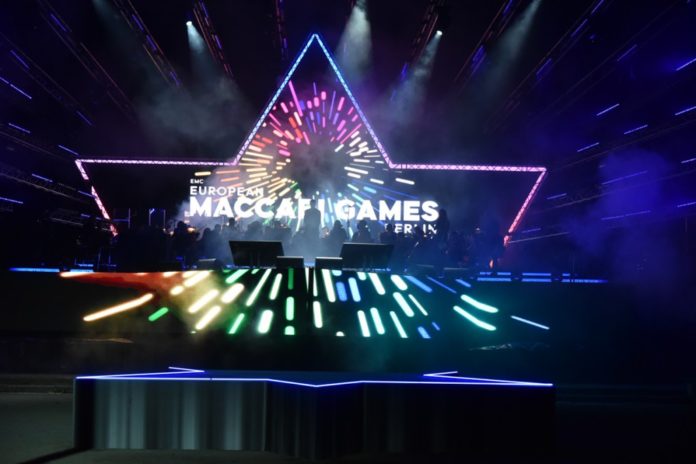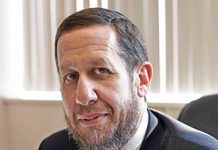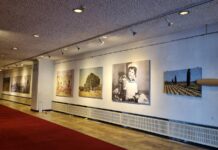
The 15th European Maccabi Games was officially opened by the President of Hungary János Áder before thousands of spectators at Új Hidegkuti Nándor Stadium in Budapest on Tuesday evening.
Yoav Galant, Minister of Aliya and Integration in Israel, Amir Peled, Chairman of Maccabi World Union and Ronald S. Lauder, President of World Jewish Congress were among special guests present.
Legendary chess player Judit Polgár and Ágnes Keleti, the oldest living Olympic champion had the honour of lighting the flame.
Three generations of athletes performed the lighting ceremony.
Nine-year-old tennis player Samu Stern entered the stadium with the torch, gave it to Polgár, who lit the fire with five-time Olympic gymnastics champion Keleti.
Hungarian State Television M4 Sport broadcast the ceremony live.
Famous Hungarian artists including Lilla Polyák, Gigi Radics, Viktor Király and Balázs Havasi participated.
Israel started the march of 42 delegations followed by other counties including Team GB.
Previous hosts Germany was accompanied by Pál Dárdai, former head coach of the Hungarian national football team and Hertha Berlin.
The Hungarian team as hosts marched out last.
A record 2,311 athletes are participating in the games, the first held in Hungary.
President Áder recalled the memory of Ferenc Kemény and Alfréd Hajós as his nations initial Jewish sporting heroes.
Kemény had a major role in organising the first modern Olympic Games as a friend of Baron de Coubertin, Hajós won the first Olympic titles for his nation.
Áder emphasised that Hungary was proud of its athletes and Jewish compatriots who contribute to the self-esteem of the country.
Motti Tichauer, European Maccabi Confederation, welcomed participants, noting the games had returned to Central-Eastern Europe after 90 years and was a celebration of Jewish life and sport.
“Finally, Hungarian Jewish athletes get the recognition they deserve for so many years,” he said.
WJC’s Lauder took to the stage and said that as he looked at participants, he saw athletes and the future of Jews.
Having flown from New York to Budapest, he admired the courage to take part in ths competition and represent Jewish identity.
Organising committee members András Heisler, Federation of Hungarian Jewish Communities, Ádám Jusztin, Maccabi VAC and Tamás Deutsch, MTK also welcomed participants.
Heisler said Hungary had the largest Jewish community of Eastern-Europe but had never entered any games with so many athletes.
Jusztin noted the 15th event honoured the memory of Jewish athletes and sports leaders of Hungary.
“Many of them were members of Hungarian sports clubs and national teams but perished because of their origins during the Shoah,” he explained.
Jusztin added that despite ordeals, Hungarian Jewish sportspersons had contributed and still contribute to great successes of Hungarian sport.
Deutsch described what hosting games meant to Hungary and Budapest.
“Organising the European Maccabi Games proves that the Hungarian nation honours the Jewish community, its culture, tradition and great personalities,” he said.
Competitions began in the morning with Switzerland scooping the first gold medal of the Games in Equestrian show jumping at the National Riding Hall.
Hungary celebrated a silver medal, USA picking up a bronze.
Ukrainian badminton player Natalia Ruthaizer was the first athlete to become a double gold medallist at the games.
Natalia and her sister Anastasia defeated Elisa Lubarov and Inna Müller from Germany to win doubles. They then both qualified for the mixed doubles finals, Natalia and Belorussian Aleksei Konakh defeating Anastasia and Mark Sames from Lithuania.
Maccabi VAC president Jusztin joined athletes on the court as a member of the Hungarian basketball team. Despite a 106-45 loss, he enjoyed the Maccabi experience.
“It was a great experience to play such talented and trained players who come from the country where basketball is played at the highest level,” he noted.
Early competitions saw the start of squash, basketball, football and volleyball.
Whilst the atmosphere in competition grew there was cultural activities away from sport.
A photo exhibition focused on the pre-Games period and the first Maccabi Games specifically selected.
A key figure of this exhibition is Israeli Zoltán Kluger, born in Hungary, Kluger was a renowned photographer surrounding the founding of the State of Israel.
The exhibition is open at Ludovika Campus until August 7.
And the Holocaust Memorial Center welcomed participants. During the games, delegations can visit free.
Established by the Government in 1999, it is one of a few institutions in the world to focus on Holocaust research and education. Linked to the Páva Street Synagogue, it was once the second largest site for Jewish worship in Budapest.
At an official reception for guests, the Mihály Keveházi accolades were presented to athletes for outstanding performance in the Jewish community. The award was based on a 1906 medal. Its creator, Gábor Dévényi, won a silver medal at the Maccabi World Games in 1989.
Recipients were Dr. András Bleyer and József Horváth (Sports Leader), Tamás Mester, Maccabi VAC water polo (Team Sports), Adam Kovács, karate: (Athlete), Katalin Mezei, basketball coach (Life Award) and Dr Lajos Szabó (Sports Traditions).
A concert took place after the ceremony with Mariann Falusi, Gabi Szucs, Eszter Vaczi and the founder of Budapest Klezmer Band, Ferenc Jávori “Fegya”.
Tichauer, Heisler, Jusztin, and Deutsch, attended a pre-games press conference.
Tichauer said participants were not only athletes but winners and everyone wanted to build the Jewish community and show diversity of Budapest to the world.
Deutsch commented that one of the goals of a multisport event was to draw attention to the fact that there are always more things that connect people than separate them.
Heisler added that 3,000 people were expected to attend a Shabbat reception at Dohany Street Synagogue.
M4 sports channel is providing a 25-minute summary of the day’s events. Live streams are also available online.
By David Saffer









